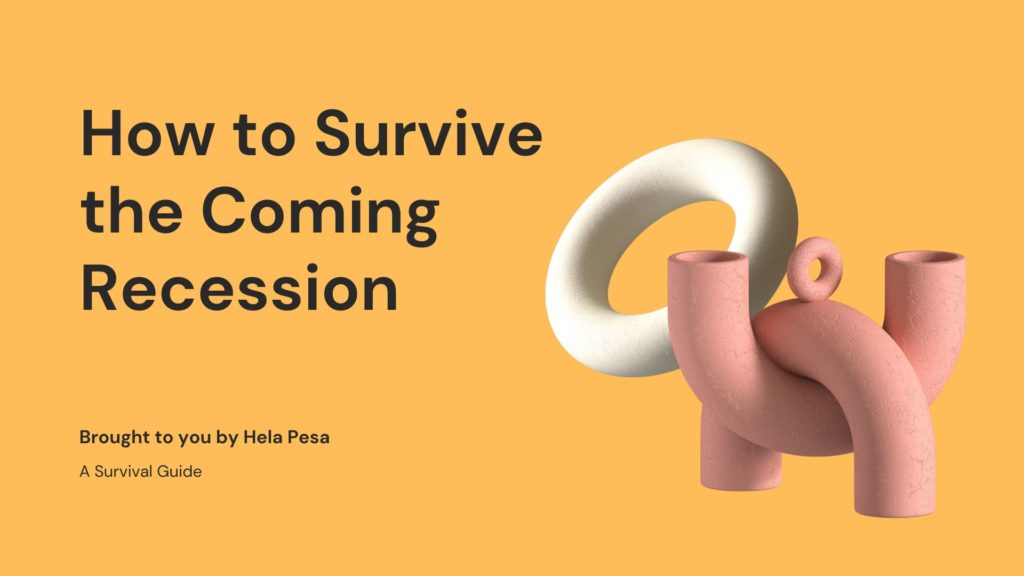with the current economic headwinds in Kenya, a recession is inevitable. A recession is a period of economic decline characterized by a decrease in the gross domestic product (GDP), employment, and trade lasting typically for six months or more. Recessions are usually accompanied by a drop in consumer spending, business investment, and government spending, leading to decreased demand for goods and services, decreased output, and increased unemployment.
The main characteristics of a recession are:
- Decrease in Gross Domestic Product (GDP): The most common definition of a recession is two consecutive quarters of negative GDP growth.
- High Unemployment: During a recession, the unemployment rate usually rises as businesses lay off workers due to decreased demand for their goods or services.
- Decreased Consumer Spending: Consumer spending, which accounts for a significant portion of GDP, typically drops during a recession as people have less disposable income and are more cautious with their spending.
- Decreased Business Investment: Businesses may cut back on investment and expansion plans during a recession, leading to reduced economic activity.
- Decreased Housing and Stock Prices: Housing prices may drop during a recession as people become more cautious with their spending, and the stock market may also experience a downturn as investors become more risk-averse.
- Increased Government Spending: Governments may increase spending in an attempt to stimulate the economy during a recession.
Recessions can have significant impacts on personal finances. Some of the ways in which recessions can impact personal finance include:
- Job loss or reduced income: During a recession, many people may lose their jobs or experience a reduction in income, making it difficult to meet their financial obligations.
- Increased debt: As a result of reduced income, many individuals may turn to borrowing to make ends meet, leading to an increase in debt.
- Decreased housing prices: Recessions can also lead to a decline in housing prices, reducing the value of a person’s largest asset.
- Market fluctuations: Recessions can also lead to fluctuations in the stock market, which can impact the value of investments and retirement accounts.
- Delayed retirement: Some individuals may have to delay their retirement plans due to the impact of a recession on their finances.
Therefore, it’s important to have an emergency fund in place, maintain a budget, and limit borrowing during a recession. Additionally, seeking financial advice from a professional can help individuals navigate their finances during uncertain times.
Steps to take to recession-proof your finances
First, you need to ensure you don’t lose your job
the biggest characteristic of a recession is mass layoff by companies trying to downsize to survive the downturn of the economy. But you don’t have to be on the chopping board if your company values your work. You can do a few things to ensure you don’t lose your job:
- Build a strong work ethic and a positive attitude: This can help you earn the trust and respect of your employer and colleagues, making you a valuable asset to the company.
- Develop in-demand skills: Stay current on industry developments and trends, and seek out opportunities to learn new skills that will be in high demand in the future.
- Be a problem-solver: Offer solutions to problems that arise at work, and show initiative in finding ways to improve processes and increase efficiency.
- Network: Build strong professional relationships with colleagues, industry leaders, and others who can help you in your career.
- Be adaptable: Be open to change and willing to take on new challenges. This will demonstrate to your employer that you are capable of adapting to new circumstances, even during a recession.
- Save and invest wisely: Save a portion of your income each month, and invest in a diversified portfolio of stocks, bonds, and other assets to help secure your financial future.
Keep your Emergency savings high
Having an emergency fund can provide financial stability and security during a recession, as it can act as a cushion against job loss, unexpected expenses, and reduced income. With an emergency fund in place, individuals and households can avoid taking on debt to pay for unexpected expenses, which can become a financial burden in the long term. An emergency fund of one year’s worth of expenses is generally recommended to help manage through an extended period of financial uncertainty.
- Automate savings: Set up an automatic transfer from your checking account to your savings account to make sure you are consistently setting aside money for your emergency fund.
- Keep the funds accessible: Place the funds in a savings account that is easily accessible in case of an emergency, but also offers some interest.
- Avoid dipping into the funds: Only use the money in your emergency fund for unexpected expenses, and avoid using it for non-essential purchases.
- Continuously add to the fund: Continuously add to your emergency fund, especially after a financial windfall or a raise, to help build it up as quickly as possible.
Remember, building an emergency fund takes time and discipline, but it’s a crucial step toward financial stability and security.
Ensure you have a long-term investment
While savings and emergency funds can come in handy during a job loss, having long-term investments can help keep the value of your net worth intact. Stocks will recover after the recession and the commodity market will always be booming during a recession.
Diversification is a strategy that involves spreading out investments across different types of assets, such as stocks, bonds, real estate, and commodities. This can help reduce risk by spreading investment capital across multiple assets, rather than relying on a single one. During a recession, diversification can help mitigate the impact of market fluctuations and potentially provide a stable return.
Here are some steps to help diversify your investments:
- Assess your portfolio: Take stock of your current investments, including the types of assets and the level of risk associated with each one.
- Consider different asset classes: Consider diversifying your investments by adding different types of assets, such as bonds, real estate, or commodities.
- Invest globally: Consider investing in a global market, as well as domestically, to take advantage of different market trends and opportunities.
- Consider alternative investments: Consider alternative investments, such as private equity, hedge funds, or real estate investment trusts, to further diversify your portfolio.
- Seek professional advice: Consider seeking the advice of a financial advisor, who can help assess your individual circumstances and provide personalized recommendations for diversifying your investments.
It’s important to keep in mind that diversification does not guarantee a profit or protect against loss. It is merely a strategy for managing risk. Additionally, it’s important to continuously monitor your investments and make adjustments as needed to ensure that your portfolio remains diversified and aligned with your financial goals.

